Lately collagen is all the rage. In bone broth, supplements, foods, and even skin care products. To look your best, feel your best, and improve overall health you need to consume collagen, right? Or so the marketing claims go.
But is there truth to the message that one needs to be taking animal-based supplements and eating animal protein to obtain the collagen our bodies need, especially as we get older?
Collagen food sources are animal-based, but our bodies also produce collagen. And eating certain plant-based foods that provide the proper nutrients can boost our body’s ability to naturally produce collagen.
What is collagen anyway?
Collagen is the most abundant protein in our bodies, found in skin, tendons, ligaments, organs, blood vessels and even our intestines. It is literally the “glue” that holds us together!
We do naturally produce collagen and require certain nutrients (from food) to do so. Collagen does decrease as we age and is the number one reason we lose it over time. But a poor diet is also a leading cause of not having enough collagen.
What does collagen do?
Collagen provides the structure our body needs. Without enough of it, or when it starts to decrease, it can lead to wrinkles, shrinking muscles, joint pain, and thinning of our intestinal lining (which can lead to digestive issues).
How can I get collagen if I don’t eat animal products?
There are abundant nutrients, vitamins, minerals, and amino acids found in the plant kingdom that work in tandem to help our bodies naturally produce the collagen it needs. These include vitamins A and C, zinc, and amino acids such as glycine, lysine and proline that are the building blocks of protein.
Which plant-based foods help boost collagen?
There are many fruits, vegetables, grains, nuts and seeds that help us naturally produce collagen. Read on to find out some of the foods containing the nutrients we need to do so, as well as my favorite ways to incorporate these foods into my diet.
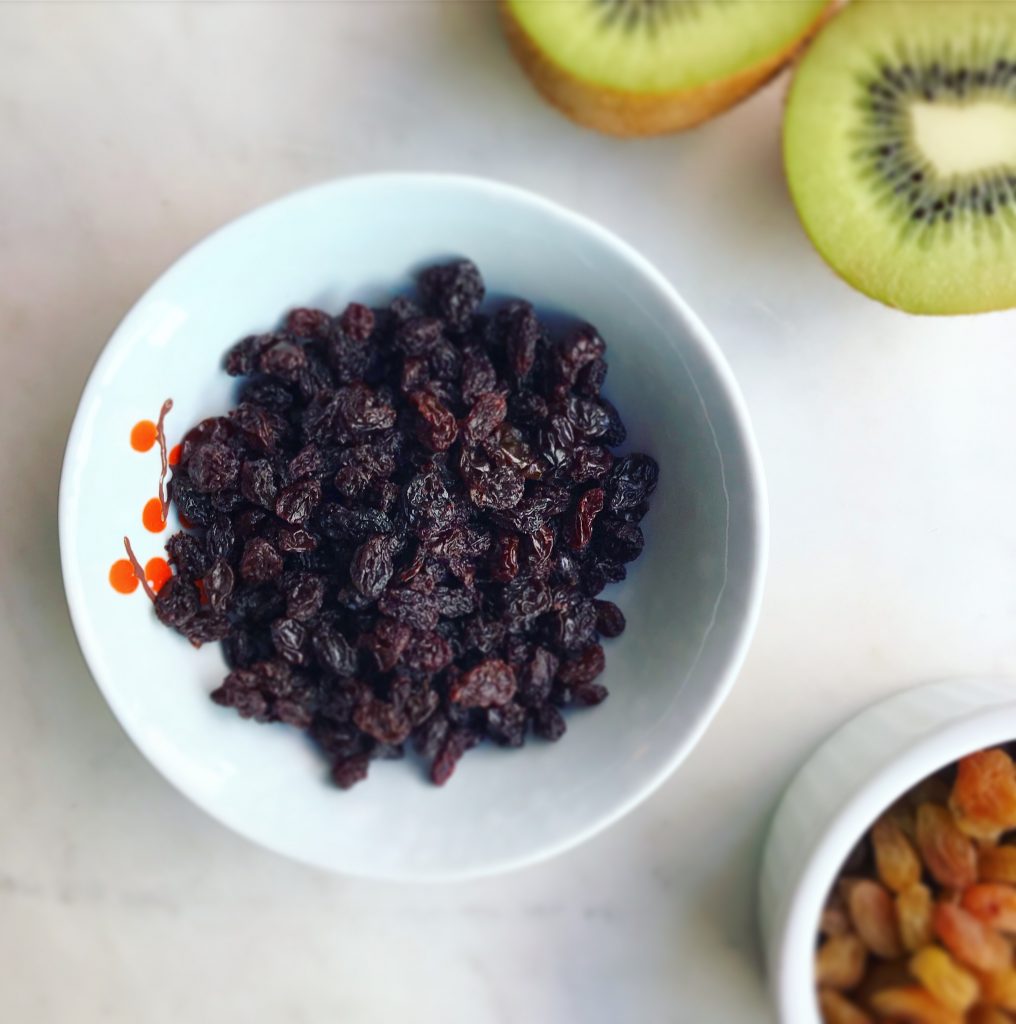
Photo: Jerran Boyer
Currants
Black currants are packed with vitamin C, an important vitamin for producing collagen naturally. Just 1/4 cup of dried currants provides more than 50% of the recommended daily value of vitamin C. Add currants to oatmeal, salads, and even grain dishes.
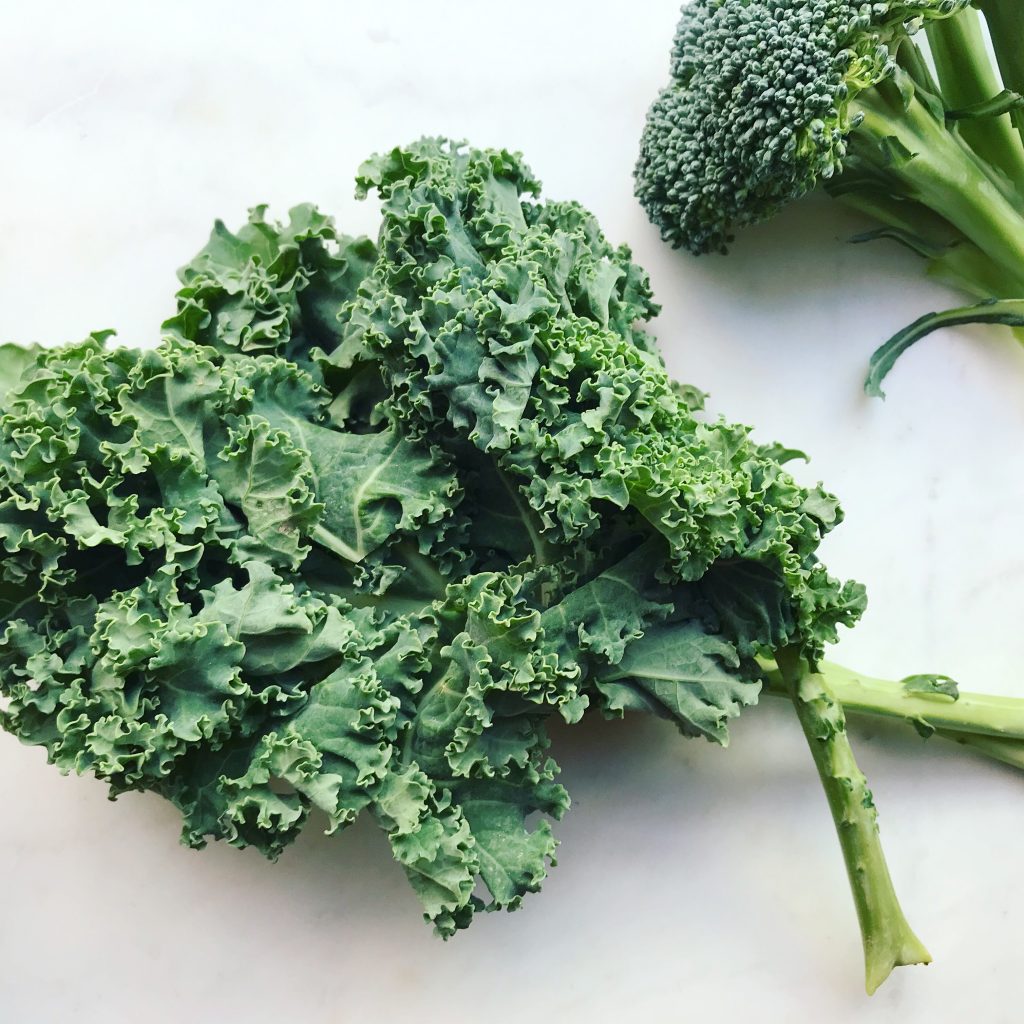
Photo: Jerran Boyer
Cruciferous Vegetables
Oranges aren’t the only thing that have tons of vitamin C. Cruciferous vegetables such as broccoli and kale are also packed with this vitamin. One cup of raw kale contains almost 90% of the recommended daily value for vitamin C, and one half cup of cooked broccoli contains over 100%.
Try roasting broccoli if it’s not your favorite vegetable. To do so, chop into bite-size florets, drizzle with a little extra-virgin avocado or olive oil, salt and pepper, then roast on a parchment lined sheet pan at 400° for 20 minutes or until tender.
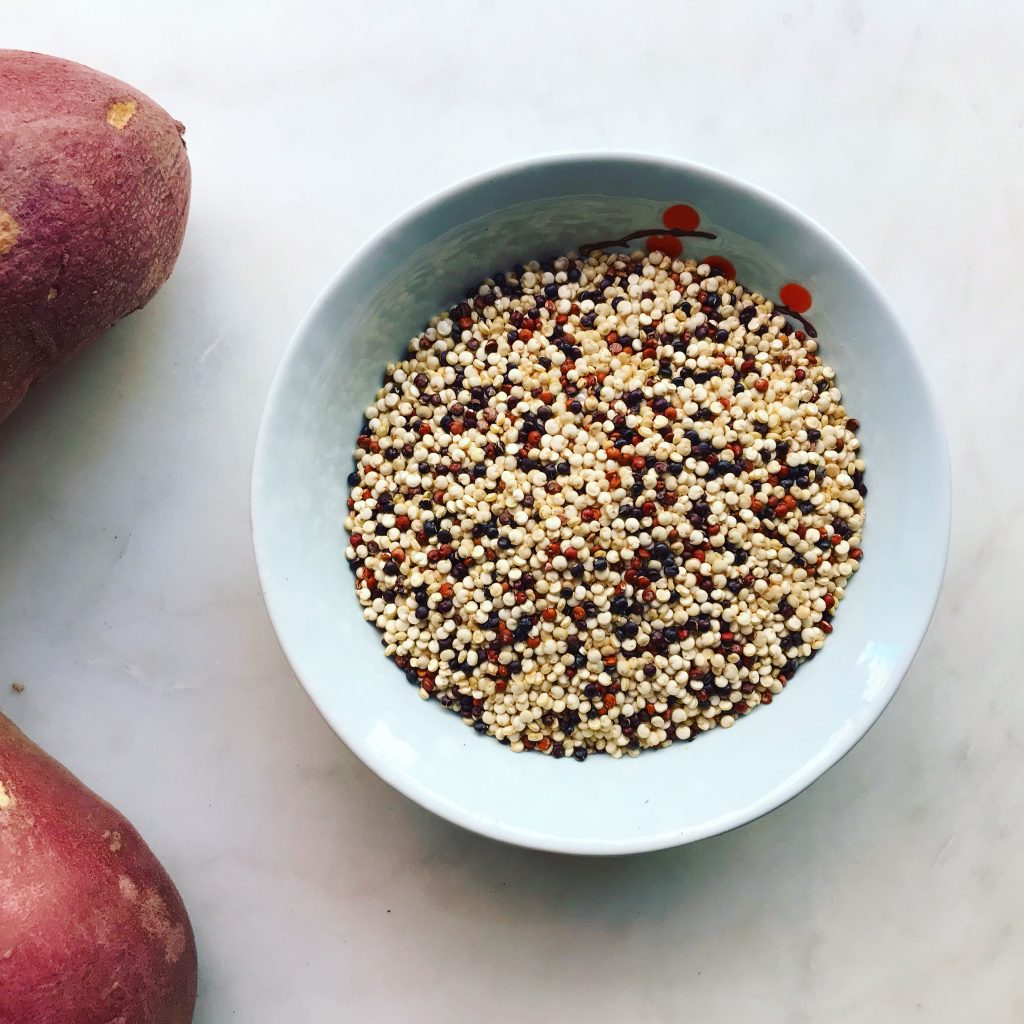
Photo: Jerran Boyer
Quinoa
In addition to hemp seeds, quinoa is one of the few plant-based proteins containing all nine essential amino acids. And like pumpkin seeds, quinoa contains zinc, also important for collagen production.
Just one cup of cooked quinoa has 8 grams of protein and 13% of the RDA for zinc. Not to mention it’s packed with other beneficial minerals! It is also naturally gluten-free for those who need or prefer to avoid gluten.
Check out my quinoa post, where I talk about this super grain and offer cooking tips.
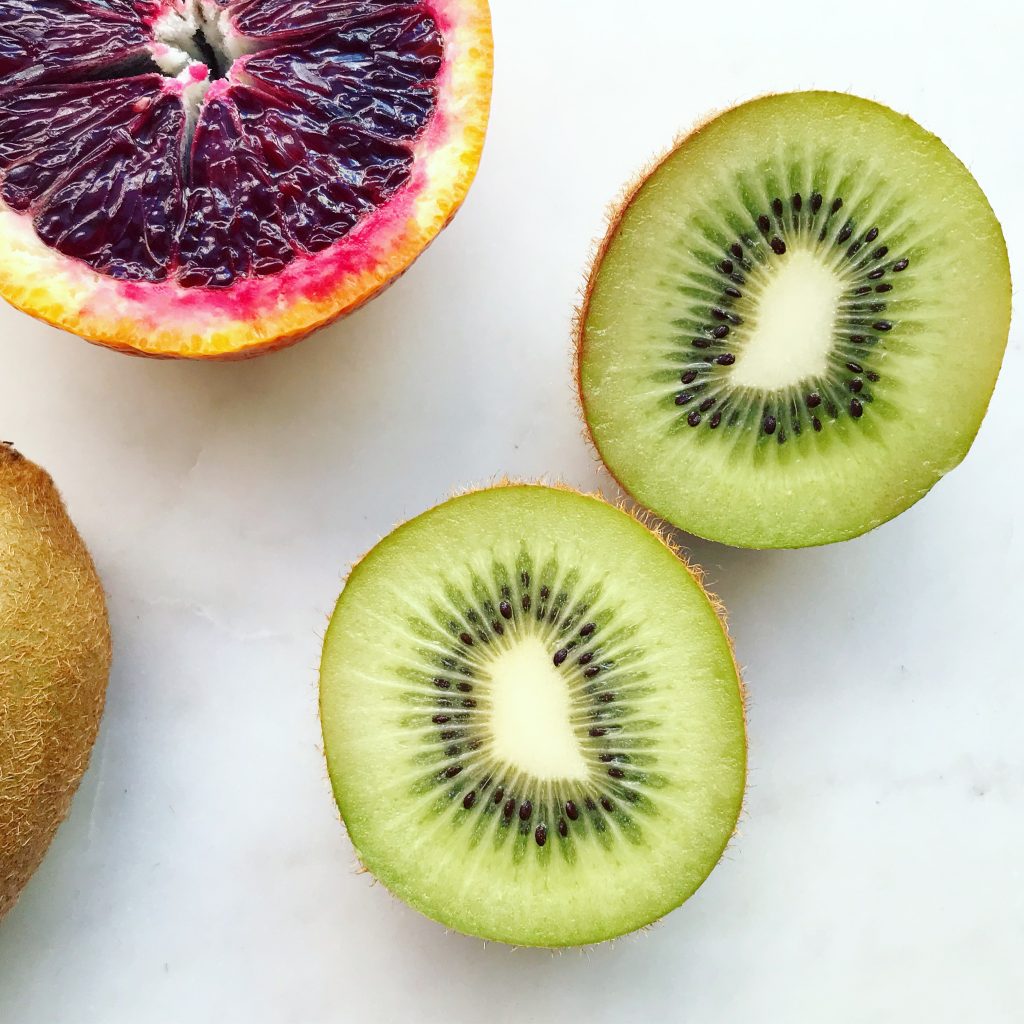
Photo: Jerran Boyer
Kiwi
Kiwi contains glycine, which is an amino acid that makes up proteins. Also rich in vitamin C, one medium kiwi contains nearly 80% of the recommended daily value. In addition to eating in fruit salads, kiwi is also delicious blended into smoothies. And did you know you can even eat the fuzzy skin?
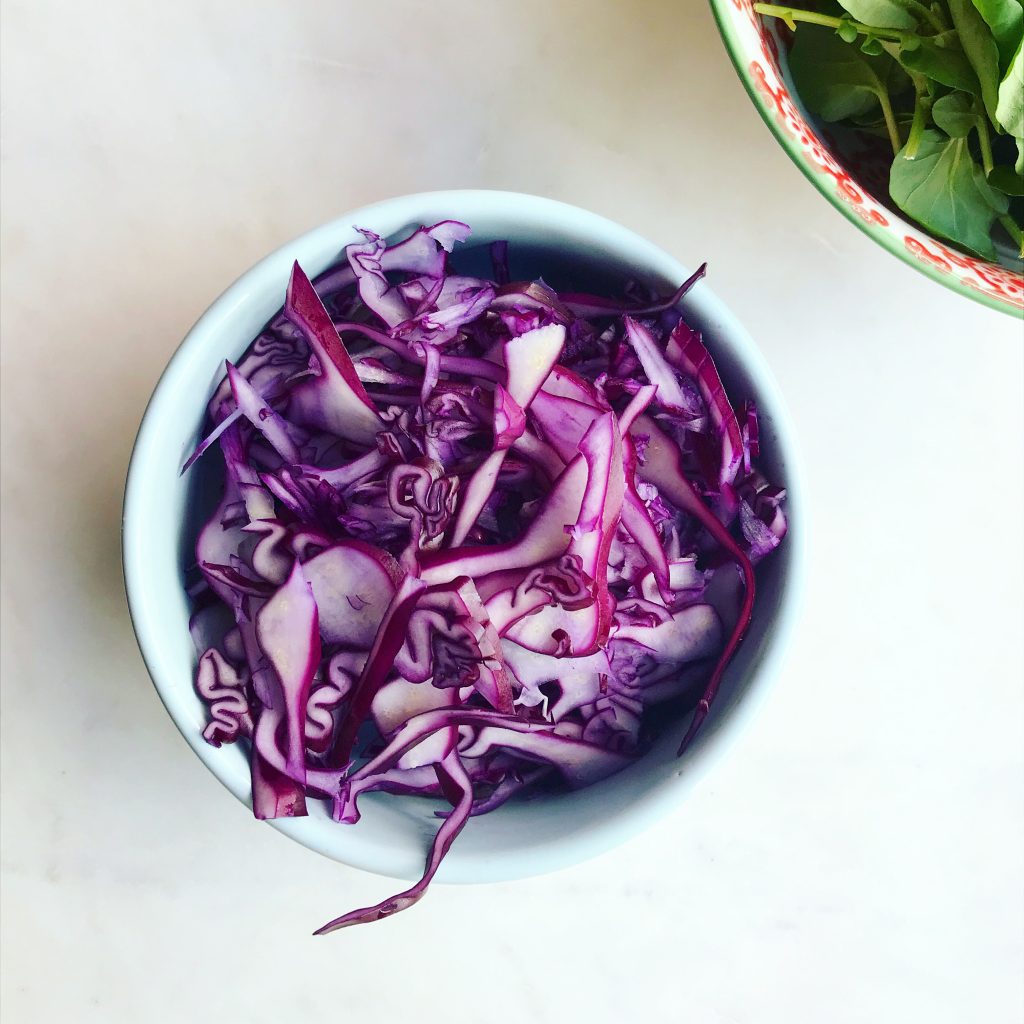
Photo: Jerran Boyer
Cabbage
Red (or purple) cabbage is rich in vitamin C and the amino acid glycine. Just one cup of chopped raw cabbage provides over 50% of the recommend daily dose of vitamin C. Vitamin C is necessary for collagen production, and also helps boost immunity and fight inflammation.
I love adding shredded red cabbage to any and all salads, as it provides crunch and color in addition to the health benefits. Tip: shred on this OXO mandolin to make it easy and quick to prepare.
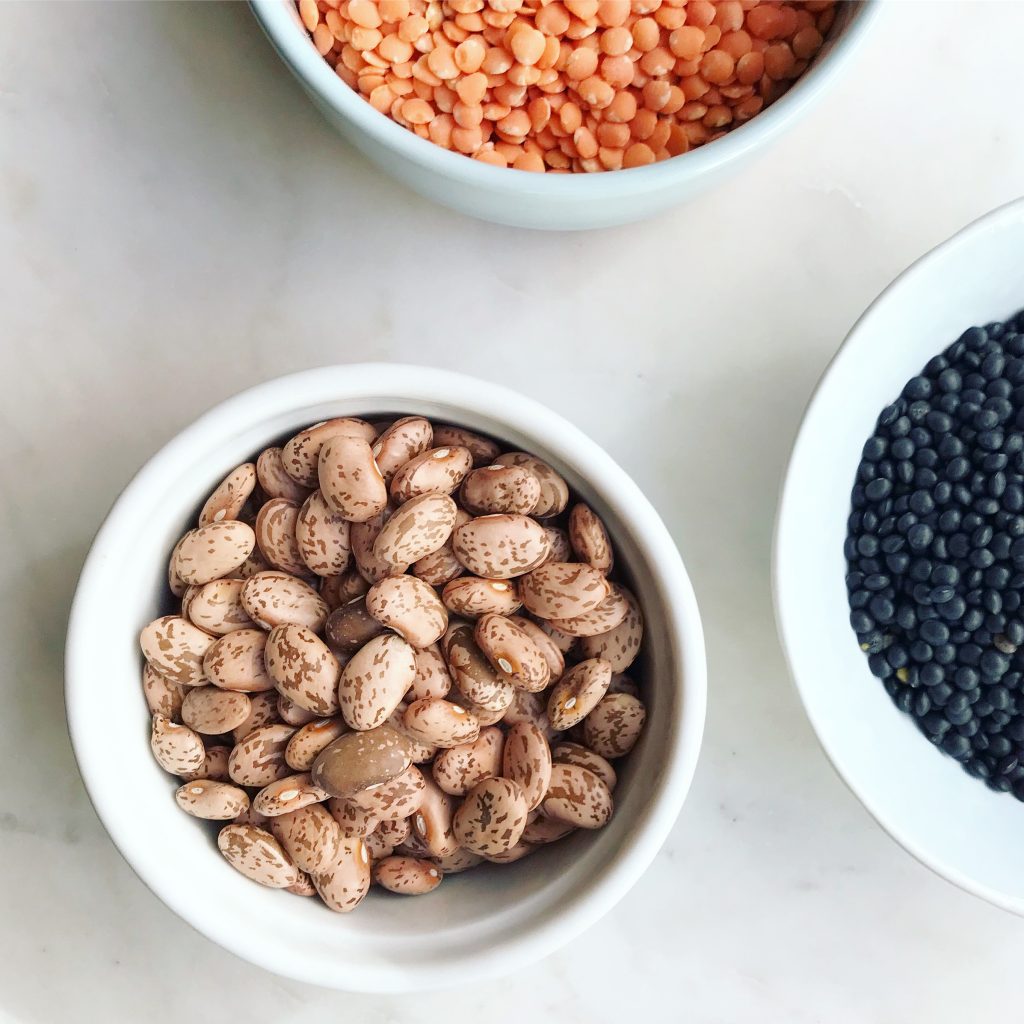
Photo: Jerran Boyer
Beans and Lentils
Not only are beans and lentils important staples of any balanced plant-based diet, but they provide essential protein, vitamins and minerals. Beans contain the amino acids glycine, lysine and proline, and lentils provide lysine. Beans and lentils also contain tons of fiber, which is important for healthy digestion.
You can pair various beans and lentils with grains, seeds, nuts, and/or other plant proteins to make up a complete protein.
My favorite way to enjoy beans is to make a Mexican-style black bean salad or Indian lentil dal. Here is a recent recipe for a Taco Salad I came up with using black beans.
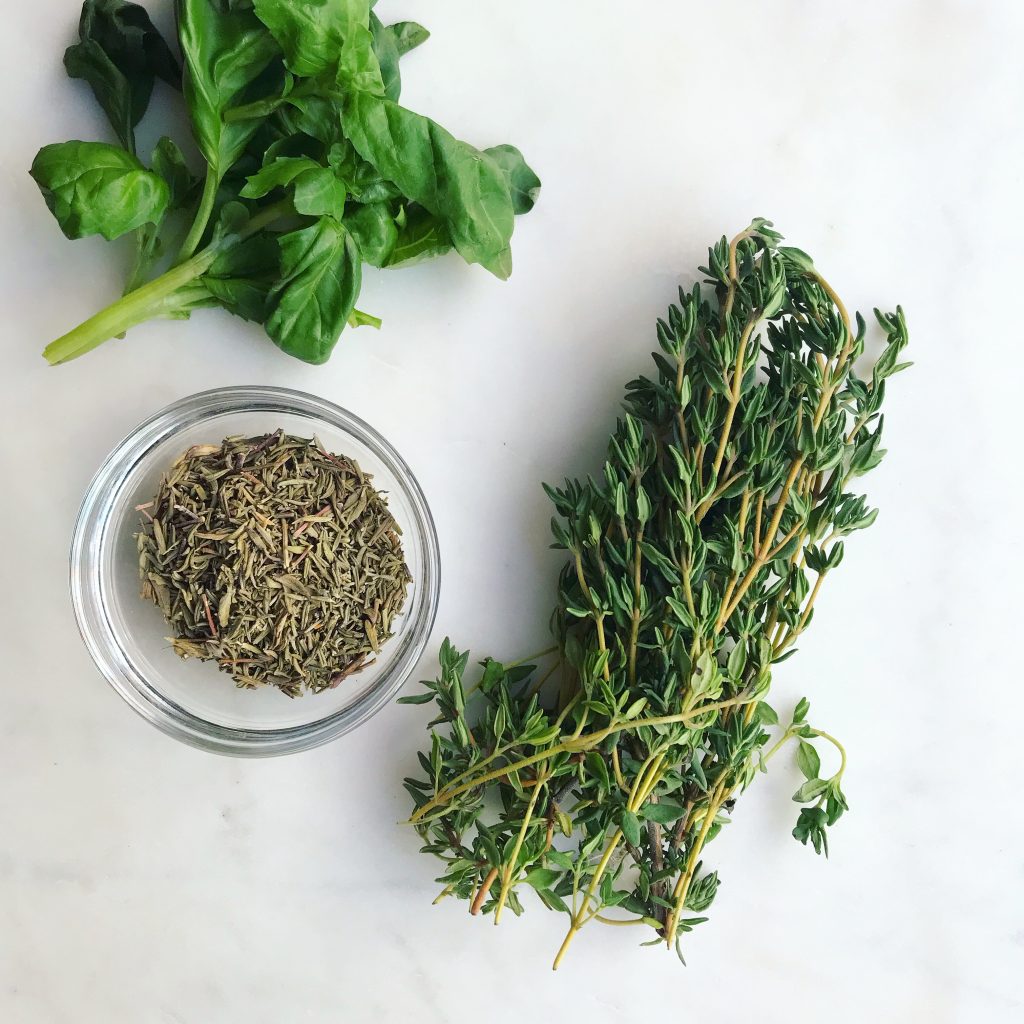
Photo: Jerran Boyer
Herbs
Did you know that per gram, thyme has three times as much vitamin C as an orange? Just two ounces of fresh thyme provides 100% of the recommended daily value of vitamin C. Parsley also contains this important vitamin needed for making collagen.
Thyme goes well with many foods, but goes especially well with plant-y foods such as beans and lentils, carrots, eggplant, mushrooms, lemon, potatoes, tomatoes, winter and summer squash and more.
My favorite way to incorporate thyme as a seasoning is using the za’atar spice blend, which contains dried thyme, sumac and sesame seeds. This spice blend is packed with vitamin C and zinc. You can make your own or purchase it at Whole Foods.
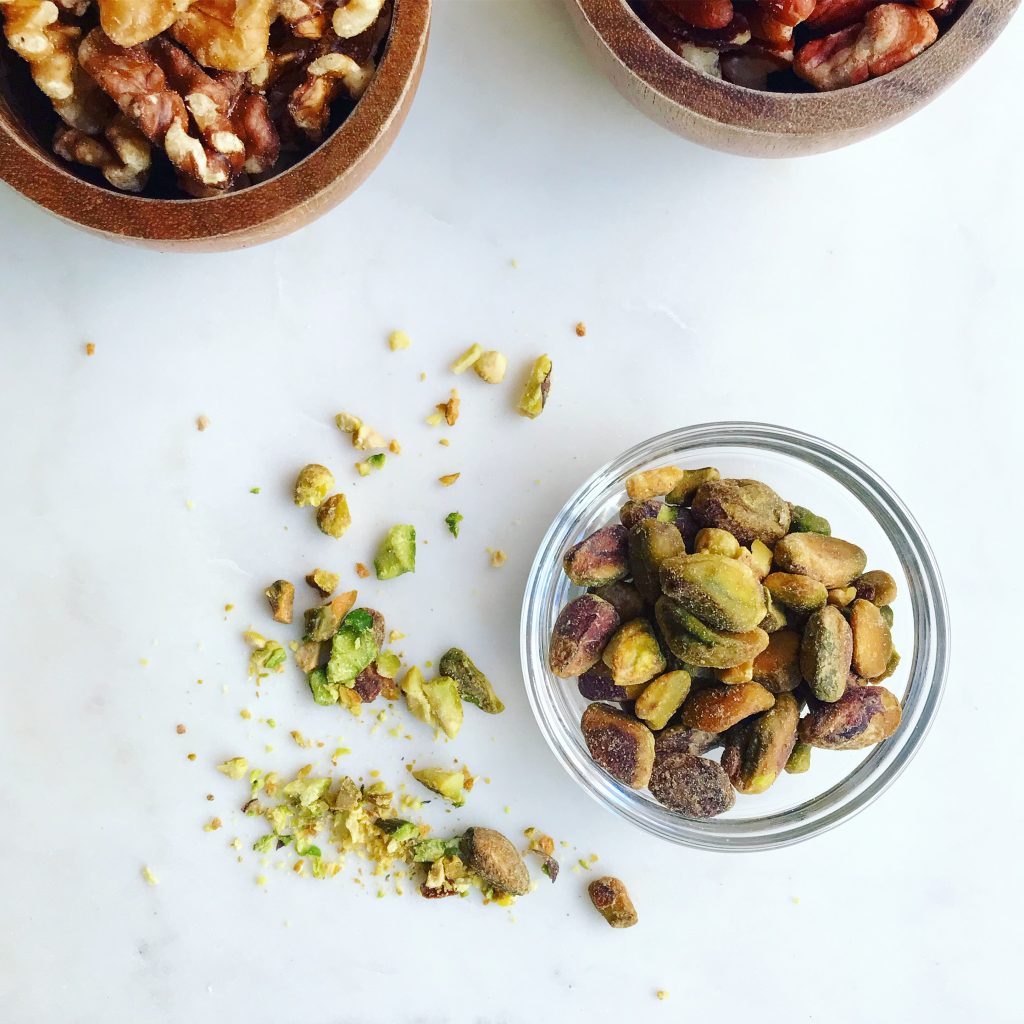
Photo: Jerran Boyer
Nuts and Seeds
Nuts and seeds also contain amino acids that can help build proteins our bodies need to function (and make collagen). Pumpkin seeds and pistachios contain lysine, and pumpkin seeds also contain the mineral zinc. Zinc is important for collagen production and a healthy immune system.
Make a homemade trail mix with pistachios, zinc-containing pumpkin seeds and dark chocolate chips. And add dried currants and freeze-dried strawberries for a bonus boost of vitamin C!
Or you can make my dukkah seasoning blend that has pistachios, pine nuts, sesame seeds and spices.
Did you know hemp seeds are a complete protein? Try adding these to smoothies, oatmeal, salads and grain dishes.
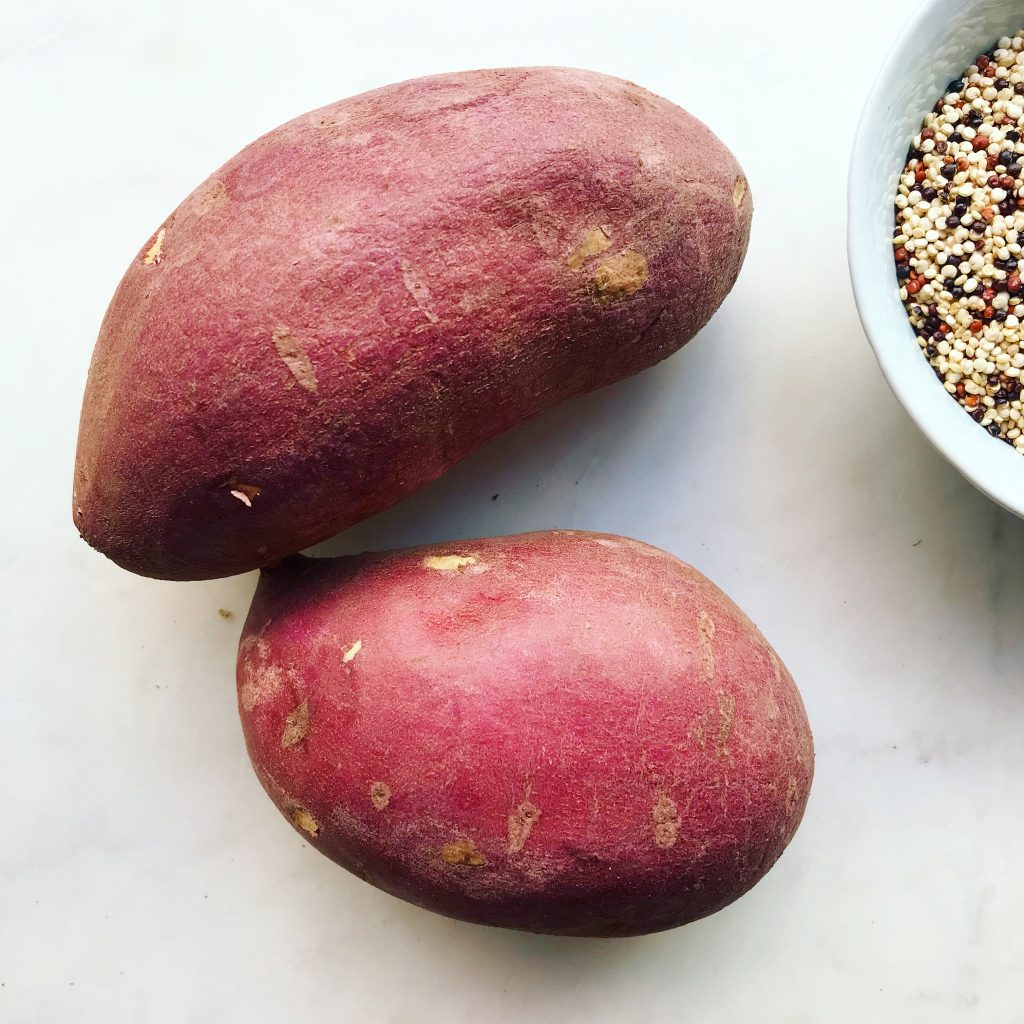
Photo: Jerran Boyer
Potatoes
Both quinoa and potatoes contain the amino acid lysine when, which combined with other amino acids, can make up a complete protein. Potatoes also have vitamin C, especially when cooked with the skin on.
My favorite way to cook potatoes is to make oven-baked sweet potato fries. To do so, scrub sweet potatoes clean with a soft vegetable brush, cut into french fry shape, drizzle with a little avocado oil, salt & pepper, and roast on a parchment-lined sheet pan at 450° for 20-25 minutes.
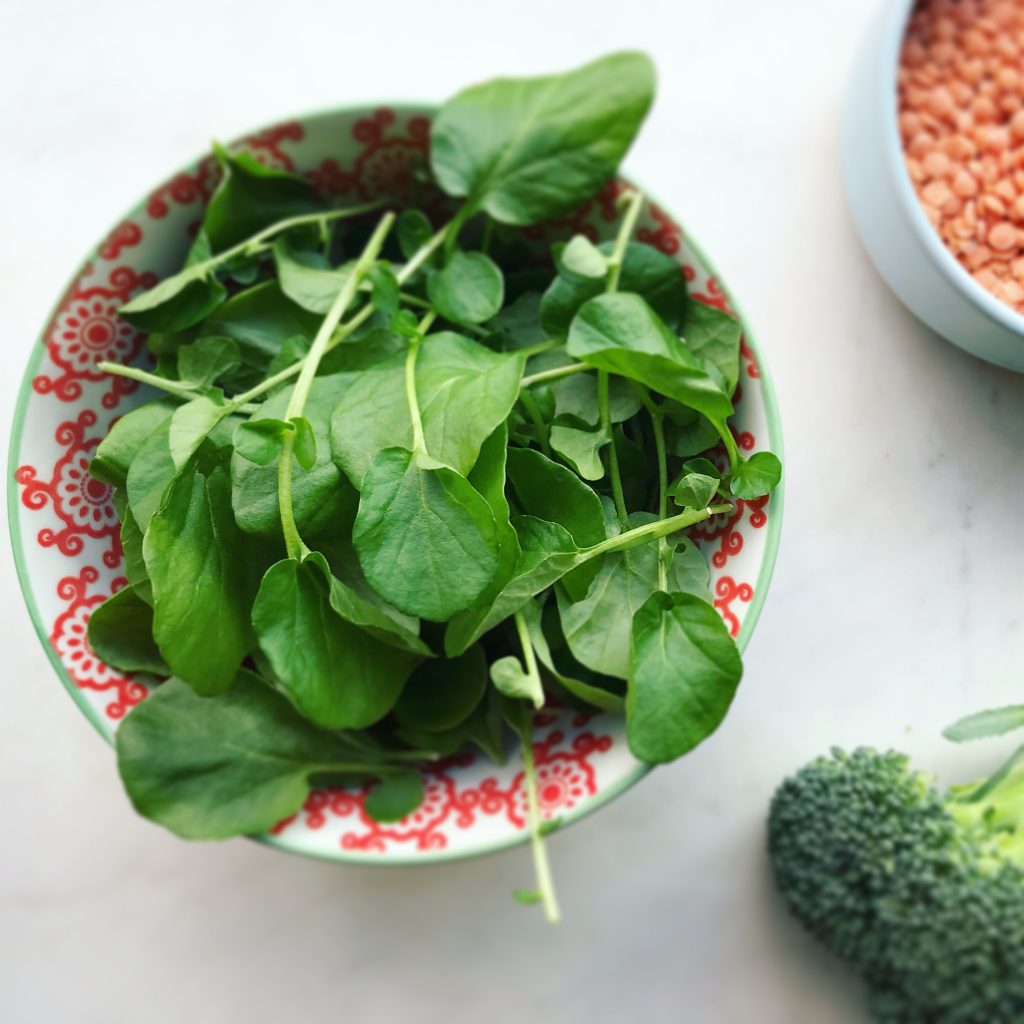
Photo: Jerran Boyer
Watercress
The amino acid proline that helps boost collagen is found in watercress, alfalfa sprouts, cucumber, cabbage, chives and more. In addition, watercress is packed with vitamins A, C and K, with just one cup providing almost 25% of your daily vitamins A and C needs, and over 100% of vitamin K.
Watercress isn’t just for afternoon tea sandwiches, it’s great in salads, grain dishes, and a healthier-than-lettuce sandwich topper.
And I love it in this Toasted Millet Salad with Lemon Miso Dressing.
Do you already eat these collagen boosting foods? If so, what is your favorite way to incorporate them into your diet? Comment below and let me know. And follow me on Instagram to get lots of recipes and cooking tips.
Sources: https://health.clevelandclinic.org, https://www.medicalnewstoday.com, https://www.organicauthority.com, https://www.healthline.com
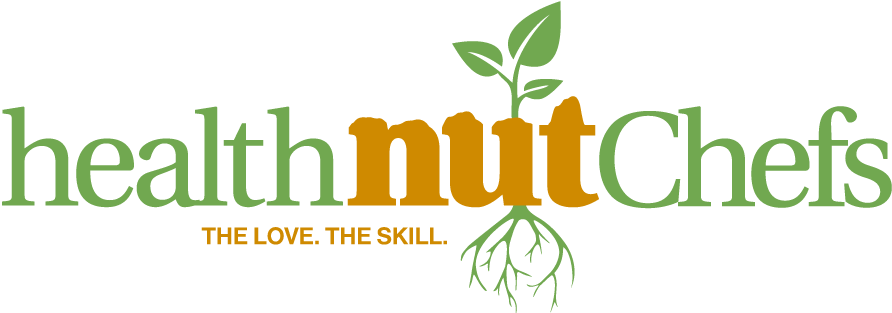
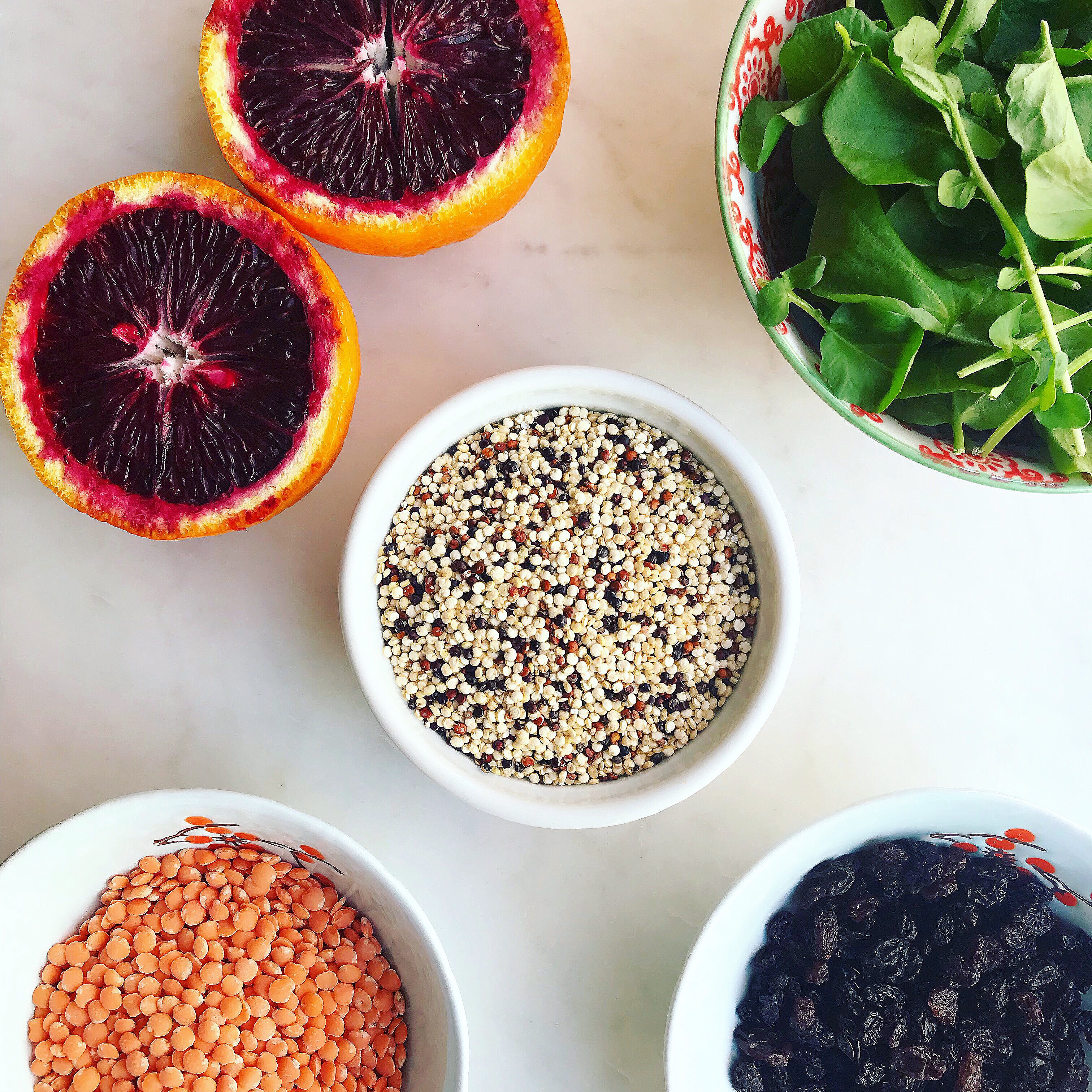
very useful information. Thank you. i am 86. i read authentic health articles.
Corrigendum :
My age is 83. I wrongly keyed in 86. My date of birth 15 February 1941.
Sorry for the error.